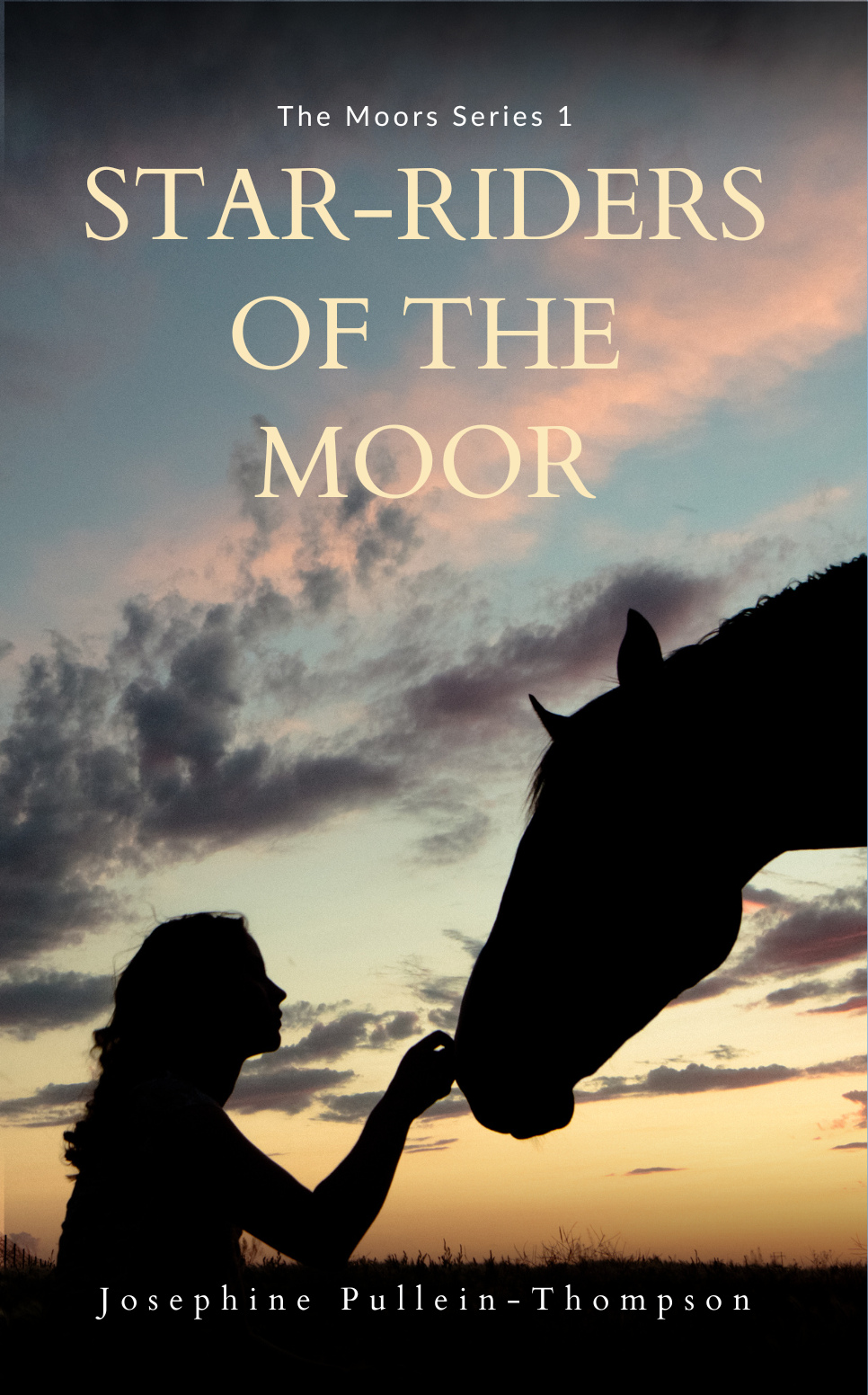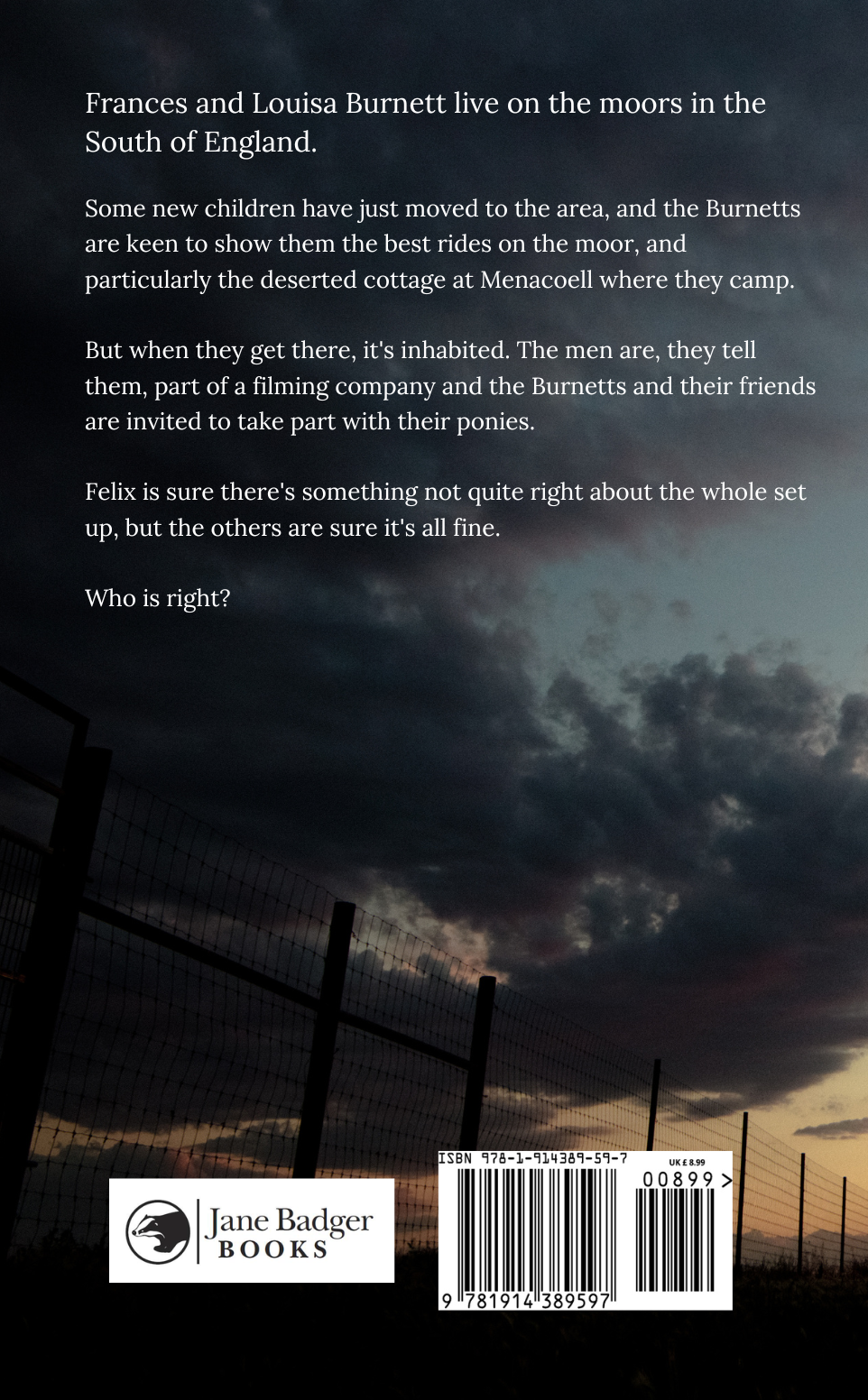Jane Badger Books
Josephine Pullein-Thompson: Star-Riders of the Moor (paperback)
Josephine Pullein-Thompson: Star-Riders of the Moor (paperback)
Illustrator:
Couldn't load pickup availability
Share
Frances and Louisa Burnett live on the moors in the South of England. Some new children have just moved to the area, and the Burnetts are keen to show them the best rides on the moor, and particularly the deserted cottage at Menacoell where they camp.
But when they get there, it's inhabited. The men are, they tell them, part of a filming company and the Burnetts and their friends are invited to take part with their ponies.
Felix is sure there's something not quite right about the whole set up, but the others are sure it's all fine. Who is right?
Not illustrated
Moors series 1
Page length: 152
Original publication date: 1976
When will I get my book?
When will I get my book?
Paperbacks are printed specially for you and sent out from our printer. They are on a 72-hour turnaround from order to being sent out. Actual delivery dates will vary depending on the shipping method you choose.
Read a sample
Read a sample
For all the time we’d lived at St Dinas, which was three-quarters of my life, there had only been three horsey families in the neighbourhood. The Burnetts—that’s us, I, Frances, and my younger sister Louisa. The Mitchells, William and Carolyn and the Jacksons, Heather, Mick and Tracy. So, when my father walked in on this evening at the beginning of the Easter holidays and announced the arrival of two new families with four children who rode, Louisa and I were delighted.
‘Boys or girls?’ ‘How old are they?’ ‘Have they got ponies?’ Ignoring our questions Daddy poured himself a drink and collapsed into a chair with a groan. Mummy asked tactfully about the measles epidemic raging in Baybourne and wearing out all the local doctors of whom Daddy is one. Then we got him back to the point.
‘Well the most important child is called Jane Shaw. She and her mother have come to live at Chapel Cottages. There seems to have been a divorce, anyway there’s no father in evidence, and Mrs Shaw decided to come here because she had happy memories of childhood holidays in Tolbay. She’s fixed herself up with a secretarial job in Baybourne and the wretched Jane will be on her own all day. I said you’d look after her.’
‘But Daddy, supposing she’s ghastly; really Ugh?’ I protested indignantly. ‘You oughtn’t to have landed us with her just like that.’
Daddy’s rather long face put on its public-spirited-look., ‘She’s thirteen, she rides, she looks a perfectly normal girl and we can’t leave a child of that age alone in a strange village, so, ghastly or not, you’ll have to look after her until she finds her feet.’
‘And what about the other family?’ asked Louisa.
‘Oh, they don’t need any help from us,’ said Daddy as though that made them less interesting. ‘Father’s Stewart Hamilton, you’ve seen him on the box, large, blond bloke. He did a programme on his trek through the foothills of Nepal and another one, on Thailand was it? Or the border of Burma? Anyway, he’s bought Penhydrock and moved his wife and three sons in just as it is. He says they’ve had enough of London and the Home Counties, they’re going to live the simple life and grow their own vegetables.’
‘The damp and draughty life,’ said Mummy. ‘There are great holes in the roof and the whole place is rotting away.’
‘How old are they?’ I asked.
‘A bit younger than me.’
‘No, not the parents, the boys.’
‘Two of them look about your age and then there’s a younger one; they’ve a pony apiece.’
Mummy began to ask questions about the two mothers and to wonder what the Hamiltons would do with Penhydrock, which was once a lovely house but had been allowed to go to rack and ruin by two old sisters who’d lived there for years and years and finally died in their nineties. Then she began to wonder what poor Mrs Shaw would do with number three Chapel Cottages, one of a tall, grim terrace of grey stone cottages and full, according to Mummy, of horrid little box-shaped rooms. Daddy picked up the paper and, realising we would learn no more, Louisa and I went back to the kitchen to finish our tack-cleaning. I was pleased about the Hamiltons, two more boys would even things up a bit, and though I like William he always behaves in a very elder-brotherly way and crushes us all with his superior knowledge. Mick’s an even nicer person, brilliant at making jumps, mending tack, and giving colic drenches, but he never says very much; he lets Heather do all the talking.
As ponies make conversation so much easier, you can always admire them or even give them a pat when you run out of things to say, we decided to take ours with us when we went next day to call on Jane. We groomed them long and energetically: brushing out great lumps of moulting hair and made them look as smart as un-clipped ponies can in April. In the summer Redwing is very elegant; gazelle-like is how I’d describe her. She’s a thirteen-three red roan mare with black points, very slender and well-bred-looking with a finely cut head and huge eyes, but since she had a pony mother and was bred and brought up on the moor, she’s very clever and surefooted.
Louisa’s Spider, a compact little brown pony, has a star which looks as though the paint ran while it was still wet and he obviously got his name from its spidery drips. He’s one of those lovely easy ponies, obliging and sensible and a very reliable jumper up to his limit which is three foot three. He only has one fault; overeating in summer, and that does make terrible problems.
Rosebank, our house, was built by a Victorian doctor. It stands in a sheltered coomb at the south end of the village and looks away from the moor, over Penhydrock and Ruveland, towards Tolbay. The main part of St Dinas, the church, the chapel, the post office and the row of cottages, might be in another world though they are only a quarter of a mile away. T, they stand on the highest part of the road with the moor all round them. They do have beautiful views in the summer, but in the winter the moor can look very bleak and the buildings standing in a long grey row seem very much at the mercy of gales and storms. Then driving rain and blizzards sweep relentlessly over the moor and the wind howls hungrily, rattling doors and windows as though trying to break in. Most people who have come to live at Chapel Cottages moved out after their first winter, except for two or three of the oldest inhabitants of St Dinas who remember sterner days, before electricity and bathrooms and television, and anyway have grown so deaf that they no longer hear the wind’s frustrated howls.
As we rode towards number three we started a slight argument about who should knock on the door. I said it was Louisa’s turn to do something embarrassing as I had answered our door to the Vicar and he’d gone on and on about the fête, one day when Mummy was out. Louisa said that I was older and so ought to be less embarrassed and generally better at managing life than she was; this is one of our parents’ arguments for making me do things Louisa won’t. I had begun to point out all the things I had had to do at nine which she still wouldn’t do at twelve, when the door of number three opened and a slim woman appeared, dressed in a paint-spattered sweater and trousers with a red-spotted handkerchief tied over her hair and wearing glasses.
She said ‘Hullo’ and I asked if she was Mrs Shaw and explained that we were the Burnetts and had come to see Jane. Mrs Shaw gave eager cries and Jane came thundering down the uncarpeted stairs. She was large for thirteen with fuzzy dark hair; like her mother she wore glasses and was spattered with paint. I didn’t feel very enthusiastic about her at first sight, but when, on seeing the ponies, she gave a shriek of delight, threw down her paint brush and rushed out to pat them, I decided that she might be better than she looked.
As Jane asked Louisa the names, ages and habits of the ponies I dismounted and discussed with Mrs Shaw the scenery and the best way to get to Tolbay and the awfulness of living in a London suburb. Then as Jane seemed so terribly horsey I asked if she would like to try Redwing. She mounted in a flash and began to let my stirrups down while her mother rushed upstairs to find her crash cap. She looked a bit top heavy on Redwing who really isn’t up to weight. William once said that she was a thoroughbred weed with both forelegs coming out of the same hole, but that was partly because she was faster than his pony and he didn’t like it. I wondered whether he would leave us all trailing behind now that he had a horse. Louisa and Jane set off up the road and vanished from sight. I stifled my anxieties and accepted Mrs Shaw’s offer of elevenses.
We went into the kitchen, which, she said, was the only habitable room in the cottage and made coffee and ate chocolate biscuits. At first she made boring remarks about Daddy being a super doctor and Louisa looking just like him, but then she began to talk about buying Jane a pony and became quite sensible. I told her about the Jacksons. How Heather, Mick and Tracy were our friends and how Mr Jackson had a small farm with a lot of grazing rights on the moor and dealt in ponies and ran trekking holidays in the summer. ‘If you want an ordinary pony for riding over the moor you can’t do better than the Jacksons,’ I explained. ‘But if you’re looking for something grander—a showjumper or—'
‘No, no, we can’t possibly afford anything grand,’ she interrupted me quickly. ‘That was the trouble at Headslow, half the children had thousand-pound showjumpers or eventers. Even the gymkhana ponies seemed to be four or five hundred; we just felt that we couldn’t compete. But here, with all this lovely country to ride over you must be able to have fun with an ordinary pony, surely?’
‘Yes, we do. Some people ride in shows, but it’s always such miles to get to them, we use our ponies mostly for transport; we’re always taking messages or looking for lost sheep or checking up on ponies that are due to foal.’
Mrs Shaw became so eager about the prospect of seeing Mr Jackson that in the end I agreed to take her and we drawing-pinned a large notice to the front door.
‘Gone to Black Tor Farm to see about a pony. Follow at once,’ and both signed it.
We passed the rest of Chapel Cottages; the post office set back from the road behind a little fence, soap powders and sweets dimly displayed in its old-fashioned paned window; the church, sharply spired among its hump backed yews and tumbling tombs. Then, where the road turned downhill, the Jacksons’ farm began and we turned left up the stone-walled lane between the tiny fields that someone, years and years ago, had coaxed out of the moor. We were half-way along the lane with the grey stone farm buildings in sight and Black Tor, a small, solitary hill topped by a great black rock dominating the moor behind, when we heard hoofs and Louisa and Jane came trotting in pursuit.
Jane said, ‘Oh she’s lovely; absolutely gorgeous!’ and flung herself off Redwing, shrieking, ‘No!’ in a very determined manner when I suggested that she should ride on to the farm. So Louisa and I decided to trot ahead to warn the Jacksons of prospective buyers and start the long and complicated process of finding suitable ponies.
The sign Black Tor Trekking Centre, blown down by the winter winds, still leaned drunkenly against the ancient hay-rake, with its curved prongs and broken shafts, that had stood abandoned for years among the nettles by the gate. The stone barns and byres straggled round the low stone farm making it difficult to tell where buildings ended and house began.
Shouting, ‘Heather, Mick, Tracy,’ we rode up to the back door. A row of disconsolate, shivering dogs and three cross-looking cats waiting outside told us that Mrs Jackson was in a bad mood. But still, this was business. I put my head nervously round the door and asked, ‘Is Mr Jackson about? We’ve got Mrs Shaw here and she wants to buy a pony.’
Who's in the book?
Who's in the book?
Humans:
Frances and Louisa Burnett, Jane Shaw, Felix, Toby and Huw Hamilton, William and Carolyn Mitchell, Heather, Mick and Tracy Jackson
Equines:
Redwing, Spider, Pirate, Bellboy, Crackers, Minstrel, Patchy
Other titles published as:
Other titles published as:
Star Riders
Series order
Series order
1. Star-riders of the Moor
2. Fear Treks the Moor
3. Ride to the Rescue
4. Ghost Horse on the Moor
5. Treasure on the Moor
6. Mystery on the Moor
7. Suspicion Stalks the Moor


Not received 😢
Waiting 3 weeks
Hello Robyn - as advised by email your books were on the way. Please let me know if you still haven't received the order and I will resend it for you.


